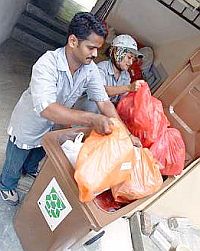| By TAN CHENG LI
Many of us find it a chore to recycle as we first have to accumulate the
items and then drive over to the nearest drop-off point or collection
centre. Residents of D’Palma Apartment in Puchong, Selangor, face the same
predicament – until three weeks ago when a novel recycling scheme took off.
Initiated by the Subang Jaya Municipal Council, the recycling effort at
the medium-cost apartments in Bandar Puteri works in a simple manner:
residents just have to segregate their waste, put them in designated
recycling bags and drop these in recycling bins found within the apartment
compound. A recycling contractor retrieves the recyclables once a week.
So far, 60 of the 300 households in D’ Palma are packing their
recyclables into three differently coloured bags provided: white for paper,
red for metals and orange for plastics. During the second week of the
project, the bins filled up so fast that they had to be emptied on a
Wednesday although the assigned collection day was Saturday.
 |
|
Cleaners store recycling bags dropped off by residents
of D’Palma Apartment in Puchong, Selangor. The contractor picks up the
materials once a week.
|
The contractor, Positive Recycle Industries, has so far carted away one
tonne of recyclables consisting mainly of newspapers, carton boxes, all
kinds of plastics and metals, particularly aluminium cans. These have earned
the residents over RM100. During collection day, the materials are weighed
and payment made immediately.
Association president Tony Toh says some residents were already recycling
but the new scheme makes it easier. “We don’t need to drive to the recycling
centre. The recycler comes to collect. The only effort is in separating the
waste and placing the bags in bins. We are helping to save the environment
and at the same time, generating money for the association.”
Mohd Hafiz Sharif, who heads the council environment unit, says the Japan
International Co-operation Agency-funded project looks into the feasibility
of recycling schemes in high-rise apartments and how they can complement
existing drop-off centres and recycling trucks.
The council plans to expand the scheme to other high-rise apartments by
bringing together resident associations, apartment managers and recyclers.
“This is one way to expand recycling. If we just rely on the council
recycling trucks, we cannot collect all. This approach gets residents’
associations involved and also support small traders and recyclers who
cannot afford to set up centres,” says Hafiz.
The council is keen to raise its estimated recycling rate of 5% as it
spends RM42mil annually to manage the 157,000 tonnes of trash generated by
its 500,000 populace.
Before the project started, D’Palma residents were briefed on the whys
and hows of recycling and given informative pamphlets. Each apartment unit
is given 12 bags every month during the duration of the project. Once
residents get into the habit of waste segregation, they can use any bag.
Right now, the bags are tagged with the apartment numbers to allow the
management office to monitor participation in the scheme. So far, only 20%
of the 300 households are doing so.
Apartment manager Abd Latiff Mohd Hassan believes awareness on recycling
among some residents is still low and some prefer to sell their recyclables
at centres as they can pocket the money. Furthermore, the occupants,
consisting mostly small families, might not have much discards.
But these are early days yet for the recycling scheme and if the bags of
recyclables are any indication, some D’Palma residents are certainly serious
about preventing their discards from going to waste. The items have been
carefully sorted and rinsed. One thoughtful resident, instead of chucking
away empty pill packs, even placed the plastic strips into recycling bags.
Now, that is recycling. |